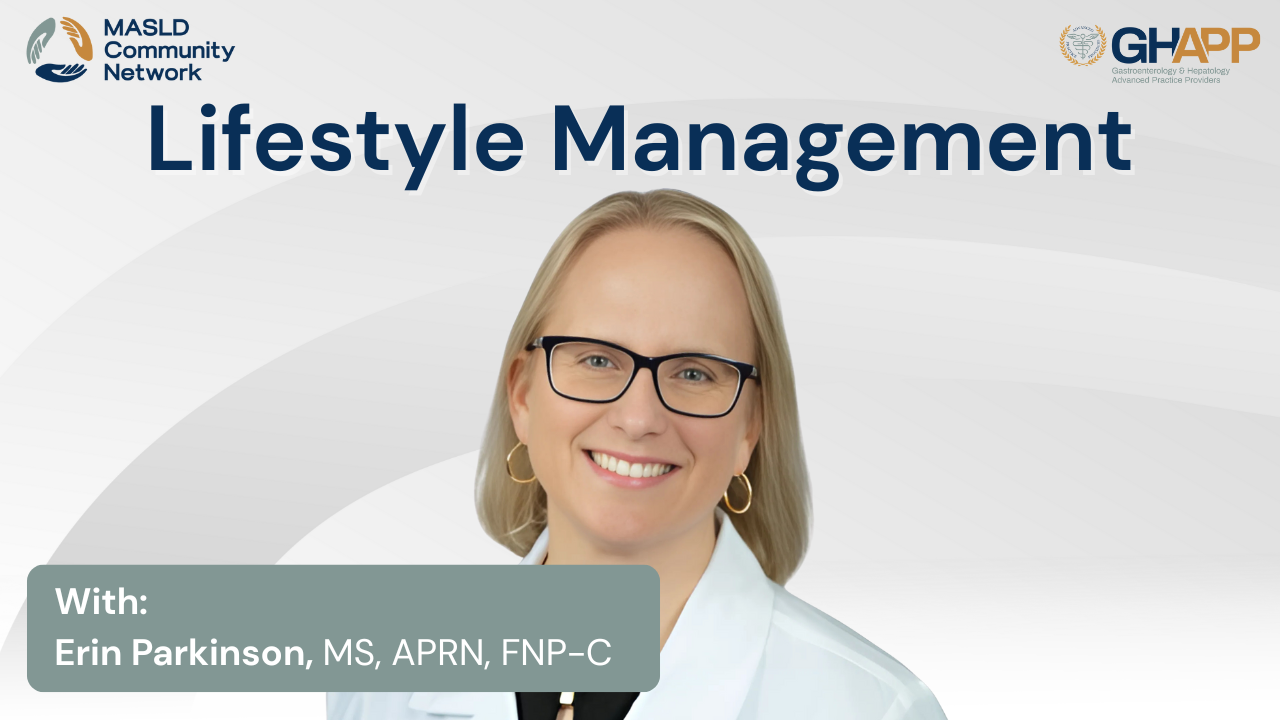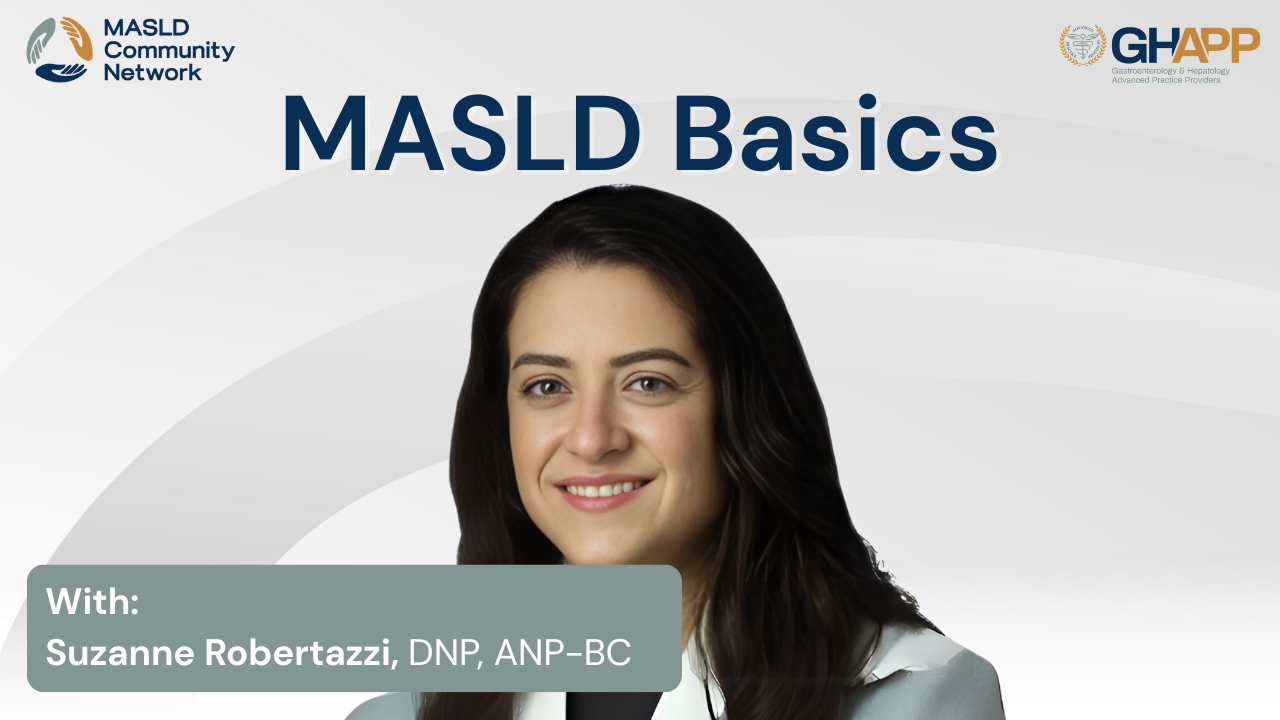
Patrick Horne
ARNP
Location : Florida, USA
BIO
Patrick M. Horne, MSN, APRN-BC, FNP, AF-AASLD is the Assistant Director of Clinical Hepatology Research and Clinical Programs Coordinator at the University of Florida’s Department of Medicine, Division of Gastroenterology, Hepatology, and Nutrition. He holds bachelor's and master's degrees from the University of Florida College of Nursing. His research focuses on hepatology clinical trials, including viral hepatitis, MASH, autoimmune hepatitis, cholestatic liver disease, and HCC. He has published extensively in clinical hepatology and has presented at major conferences such as AASLD, AGA NP/PA, and GHAPP.
MASLD-MASH Content Featuring Patrick

Lifestyle Management With Erin Parkinson

In this impactful session from the GHAPP MASLD Community Network, Erin Parkinson, NP, explores the vital role of lifestyle modifications in the management of MASLD (Metabolic dysfunction-associated steatotic liver disease) and MASH (Metabolic dysfunction-associated steatohepatitis). Through the lens of a real-world case study, Erin illustrates how clinical tools like FIB-4 and FibroScan® can be used to assess fibrosis risk and guide interventions for patients presenting with metabolic syndrome and hepatic steatosis. With a focus on practical, personalized care, this presentation highlights how diet, exercise, and culturally sensitive counseling can meaningfully reduce hepatic fat, inflammation, and fibrosis—key factors in preventing progression to cirrhosis or hepatocellular carcinoma. Erin discusses the impact of processed foods, high-fructose corn syrup, and sedentary behavior, while offering actionable guidance on introducing Mediterranean diets, intermittent fasting, and realistic exercise goals tailored to individual readiness and barriers. Whether you're a hepatology specialist, primary care provider, or obesity medicine clinician, this talk delivers tools to better support patients with MASLD/MASH through sustainable behavioral change and longitudinal follow-up.
Watch Now

MASLD Basics With Suzanne Robertazzi

Join Suzanne, a nurse practitioner from the Washington DC VA Medical Center, as she kicks off a comprehensive lecture series on steatotic liver disease, focusing on the evolving understanding of MASLD (Metabolic dysfunction-associated steatotic liver disease) and MASH (Metabolic dysfunction-associated steatohepatitis). In this foundational session, Suzanne walks through the new nomenclature replacing NAFLD and NASH, and outlines the clinical criteria used to identify and stratify patients along the MASLD–MASH spectrum. Learn how metabolic risk factors such as obesity, prediabetes, hypertension, and dyslipidemia contribute to disease progression, and explore the use of non-invasive diagnostic tools like Fib-4, FibroScan, and ELF scores to assess fibrosis. The session also discusses indications for liver biopsy, the implications of overlapping etiologies (like alcohol-associated liver disease), and strategies for identifying patients at high risk for cirrhosis, hepatocellular carcinoma (HCC), and liver-related mortality. This lecture equips clinicians, particularly those in primary care and hepatology, with a practical framework to evaluate steatosis, interpret metabolic profiles, and determine when to refer patients for specialty care. Whether you're new to liver disease or looking for updates on MASLD and MASH terminology, this session is an essential starting point.
Watch Now

APP Insight: Common Questions from Patients About MASH

In this insightful video, Patrick Horne, NP, from the University of Florida, addresses some of the most frequently asked questions from patients diagnosed with MASLD (Metabolic Dysfunction–Associated Steatotic Liver Disease) and MASH (Metabolic Dysfunction–Associated Steatohepatitis). Drawing from his clinical experience, he answers common concerns such as: “How did I get fatty liver if I don’t drink alcohol?”, clarifying that alcohol is not a necessary factor in developing these conditions—rather, metabolic risk factors like obesity, diabetes, hypertension, and genetic predisposition play a significant role. Patrick also dives into lifestyle recommendations, including the importance of adopting a mediterranean diet, engaging in regular physical activity, and setting realistic weight loss goals. Additionally, he tackles the nuanced question of alcohol consumption in patients with MASLD/MASH, emphasizing individualized care depending on the stage of liver disease. This session is a must-watch for both patients and providers seeking practical, evidence-based guidance on managing metabolic liver disease.
Watch Now

Management of Life Style Modification

This video focuses on the comprehensive management of patients with metabolic-associated steatohepatitis (MASH), emphasizing lifestyle modifications, dietary adjustments, and exercise strategies. Key topics include the importance of addressing risk factors like diet, exercise habits, and alcohol intake, as well as referrals to medically supervised weight loss clinics or bariatric surgery for advanced cases. The speaker highlights the benefits of the Mediterranean diet, intermittent fasting, and avoiding ultra-processed foods while discussing the role of resistance training to combat sarcopenia and maintain muscle mass. Practical advice and tailored recommendations ensure a holistic approach to managing MASH and improving patient outcomes.
Watch Now

Third Step of Life Style Management

This video provides a comprehensive overview of emerging pharmacologic treatments for metabolic-associated steatohepatitis (MASH) and their tailored applications based on patient profiles. Topics include FDA-approved therapies, drugs in advanced clinical trials (such as semaglutide and lanifibranor), and the potential for combination treatments targeting both steatohepatitis and fibrosis. The speaker emphasizes the importance of patient-specific approaches considering metabolic profiles, obesity, and diabetes status, alongside lifestyle interventions. Additionally, the video discusses the evolving interdisciplinary care model and highlights the exciting progress in non-invasive testing and treatment advancements for F2-F3 fibrosis.
Watch Now

Approved Medication for MASH/NASH

This video provides detailed guidance on selecting and monitoring patients for emerging therapies targeting advanced fibrosis (F2-F3) in NASH. Key topics include contraindications for patients with cirrhosis, considerations for concomitant medications, and dose adjustments for statins. The video outlines ideal candidates based on specific thresholds for VCTE, MRE, ELF scores, and other non-invasive tests while emphasizing the importance of ruling out portal hypertension and other liver diseases. It also reviews a stepwise monitoring approach, focusing on tolerability at three months and efficacy assessments at six and twelve months, with an emphasis on histologic and non-invasive test improvements.
Watch Now

Types of Diet for the Treatment of MASLD

This video explores comprehensive strategies for managing metabolic-associated steatohepatitis (MASH), focusing on fibrosis risk stratification, lifestyle modifications, and pharmacologic interventions. Learn about dietary recommendations like the Mediterranean diet, exercise guidelines emphasizing resistance training, and the role of intermittent fasting and processed food avoidance. The video also highlights weight loss targets, diabetes management, and emerging therapies such as GLP-1 receptor agonists and bariatric surgery, all aimed at improving liver health and patient outcomes.
Watch Now

NITs to Identify High Risk MASH Patients

Explore advancements in non-invasive diagnostics and risk stratification for liver fibrosis and MASH. This video highlights tools like FIB-4, transient elastography, and innovative scoring systems (e.g., FAST and Agile) to identify and predict outcomes for high-risk patients. Learn about serum biomarkers, updated guidelines, and the role of lifestyle interventions alongside targeted therapies for managing metabolic risks and advancing care in hepatology.
Watch Now

GHAPPcast: Recognizing the Severity of MASH

Thank you to Madrigal for sponsoring this episode of GHAPPcast. In this episode of GHAPPcast, nurse practitioners Patrick Horne and April Morris from discuss the complexities of identifying and managing patients with metabolic-associated steatohepatitis (MASH). They explore clinical approaches, including the use of bloodwork, family history, and advanced diagnostic tools such as FibroScan, to recognize patients at risk. Patrick and April emphasize the importance of lifestyle interventions like diet and exercise alongside new medical therapies, while also offering practical tips for clinicians on patient monitoring and treatment management. Tune in for valuable insights into managing MASH in clinical practice.
Watch Now

Podcast: Viral Hepatitis and MASH/MASLD: Understanding the Connection

In this episode, Patrick Horne, NP from the University of Florida, explores the important connection between viral hepatitis and MASLD/MASH (Metabolic Dysfunction–Associated Steatotic Liver Disease/Steatohepatitis). While patients may present with a presumed diagnosis of MASLD or MASH, Patrick emphasizes the critical need to rule out coexisting liver diseases such as hepatitis B and C. The presence of both metabolic and viral liver diseases can significantly accelerate liver inflammation, fibrosis progression, and ultimately cirrhosis—a concept he explains using the “two-hit” or even “three-hit” theory. Patrick walks through the recommended screening protocols, including one-time HCV testing for all adults over 18 and complete HBV panels to assess for immunity, past exposure, and chronic infection. He stresses that treating viral hepatitis—especially with today's highly effective antivirals—can and should occur alongside lifestyle modification strategies for MASLD/MASH. He also discusses how liver stiffness measurements can be skewed by active inflammation and suggests reassessing fibrosis after treating viral hepatitis. This episode is a must-watch for providers managing patients with liver disease, highlighting the need for a comprehensive, layered diagnostic approach.
Watch Now

Addressing Health Disparities: Equity Considerations in MASH/MASLD Care

In this episode, Patrick Horne, NP at the University of Florida (UF Health), explores the impact of health disparities and socioeconomic inequality on the diagnosis and management of MASH (metabolic-associated steatohepatitis) and MASLD (metabolic dysfunction-associated steatotic liver disease). With a focus on rural and underserved populations, Patrick discusses how limited access to quality healthcare, healthy food, exercise options, and non-invasive testing (NITs) like FibroScan or MRI elastography can delay diagnosis and worsen outcomes. He shares practical, empathetic strategies for individualizing care, such as using accessible tools like FIB-4 or APRI, promoting low-cost physical activity like walking or swimming, and providing culturally sensitive nutrition advice tailored to financial and geographic realities. Patrick emphasizes the provider’s role as a patient advocate and coach, helping patients navigate barriers and create sustainable lifestyle modifications. This episode offers key insights for clinicians working to close gaps in care and promote equity in liver disease management.
Watch Now
FAQ's

APP Insight: Common Questions from Patients About MASH

In this insightful video, Patrick Horne, NP, from the University of Florida, addresses some of the most frequently asked questions from patients diagnosed with MASLD (Metabolic Dysfunction–Associated Steatotic Liver Disease) and MASH (Metabolic Dysfunction–Associated Steatohepatitis). Drawing from his clinical experience, he answers common concerns such as: “How did I get fatty liver if I don’t drink alcohol?”, clarifying that alcohol is not a necessary factor in developing these conditions—rather, metabolic risk factors like obesity, diabetes, hypertension, and genetic predisposition play a significant role. Patrick also dives into lifestyle recommendations, including the importance of adopting a mediterranean diet, engaging in regular physical activity, and setting realistic weight loss goals. Additionally, he tackles the nuanced question of alcohol consumption in patients with MASLD/MASH, emphasizing individualized care depending on the stage of liver disease. This session is a must-watch for both patients and providers seeking practical, evidence-based guidance on managing metabolic liver disease.
Watch Now











